八年级下Unit4教案
人教版八年级英语下册教案(RJ) Unit 4

Unit 4Why don't you talk to your parents?第一课时Section A (1a-2d)1.重点单词:allow,wrong,guess,deal2.重点短语:write him a letter,talk about,look through,work out3.重点句式:Why don't you talk to your parents?My parents don't allow me to hang out with my friends.I got into a fight with my best friend.What's wrong?I don't want to surprise him.I don't want to talk about it on the phone.I had a fight with my best friend.You should call him so that you can say you are sorry.I found my sister looking through my things.But why don't you forget about it so that you can be friends again?Although she is wrong,it's not a big deal.Hope things work out.1.重点短语和句型2.用Why don't you...?向他人提出建议1.重点短语和句型2.用Why don't you...?向他人提出建议一、预习课本P25-26新单词并背诵,完成下面的汉译英。
1.允许____________ 2.错误的____________3.猜测____________ 4.协议____________二、认真预习1a-2d找出下列短语和句型。
八年级下册unit4教案

Unit 4 He said I was hard-working . Teaching goals:1. Vocabulary: hard-working ,report card ,can do better ,speaking,listening ,average ,surprise .2. Patterns: What did your math teacher say ?He said he could speak three languages .Important and difficult points :1. New words and expressions.2. How to write a report card.Teaching aids : teaching cards , pictures and a tape recorder .Period 1Teaching contents:SectionA 1a,1b,1c,2a,2b,2c,Grammar focus . Teaching procedures :Step 1 Leading inAsk several Ss what they are going to do after school .Write their sentences on the Bb .Step 2 Pre-taskSay, These Ss talk about what they are going to do after school ,if you want to tell a friend what they said ,how would you tell him ?Write the words “He said” and “She said” on the Bb .Say,We can use the words “He said” and “She said” to tell your friend like this :He/She said he/she was going to play basketball after school .Get the Ss to repeat . Repeat this process with the other sentences on the Bb .Step 3 While-taskSB Page 26 , 1a .1. Ask a student to read the four questions .2. point out the TV screens in the picture .Ask one student to read whatthe person says in the first picture .Then ask another student :Whatdid she/he say ? Help to answer :She/He said she/he was having asurprise party for Lana on Friday night .3. Repeat with the other pictures .SB Page 26 , 1c .Pairwork.First Ss work in pairs ,then ask some pairs to present their dialogues to the class .SB Page 26 , 1b .Play the recording and correct the answers .Step 4 Post-taskSB Page 27 , 2a & 2b .1. Ask several Ss to read these sentences .2. Play the recording .Ss circle their answer .3. Check the answers .Step 5 Grammar Focus1. Review the grammar box by ask Ss to say the statements .2. Explain: In each case ,the direct speech talks about present situationsand the reported speech talks about past situations .Step 6 HomeworkUse he \she said rewrite the sentences.1. I am a clever girl .2. I am having lunch at school .3. I can dance well .4. I play football every day .5. I don’t like my younger brother .。
2020-2021学年人教版英语八年级下册Unit4SectionA1a—2d教案
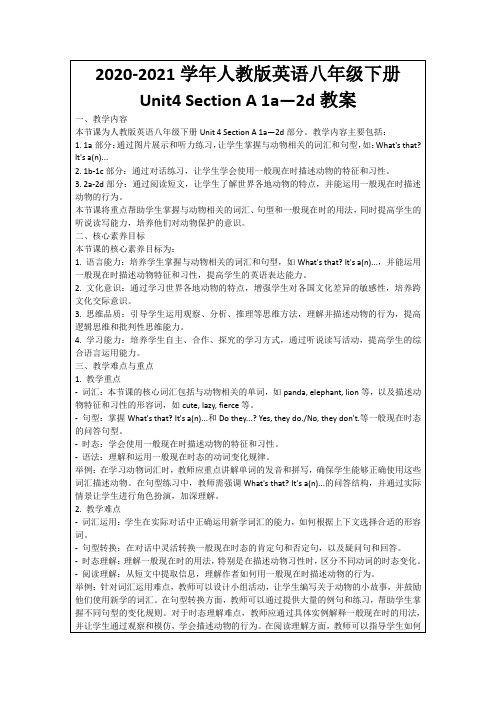
本节课的核心素养目标为:
1.语言能力:培养学生掌握与动物相关的词汇和句型,如What's that? It's a(n)...,并能运用一般现在时描述动物特征和习性,提高学生的英语表达能力。
2.文化意识:通过学习世界各地动物的特点,增强学生对各国文化差异的敏感性,培养跨文化交际意识。
3.思维品质:引导学生运用观察、分析、推理等思维方法,理解并描述动物的行为,提高逻辑思维和批判性思维能力。
4.学习能力:培养学生自主、合作、探究的学习方式,通过听说读写活动,提高学生的综合语言运用能力。
三、教学难点与重点
1.教学重点
-词汇:本节课的核心词汇包括与动物相关的单词,如panda, elephant, lion等,以及描述动物特征和习性的形容词,如cute, lazy, fierce等。
2020-2021学年人教版英语八年级下册Unit4 Section A 1a—2d教案
一、教学内容
本节课为人教版英语八年级下册Unit 4 Section A 1a—2d部分。教学内容主要包括:
1. 1a部分:通过图片展示和听力练习,让学生掌握与动物相关的词汇和句型,如:What's that? It's a(n)...
五、教学反思
在今天的教学过程中,我发现学生们对于动物词汇的学习非常感兴趣,他们积极参与到课堂活动中,踊跃回答问题。通过图片和实际情景的展示,学生们能够更好地记忆和理解新词汇。然而,我也注意到,在运用一般现在时态描述动物特征和习性时,部分学生还存在一定的困难。
首先,对于词汇的掌握,我认为可以继续采用图片、实物等直观教具,帮助学生加深印象。同时,结合课后作业,让学生多读、多写,巩固所学词汇。
新目标英语八年级下unit4 he said i was hard working教案

新目标英语八年级下Unit 4 He said I was hard-working教案一、教材内容分析本单元的中心话题是:Report someone said. 围绕这一话题,主要涉及句型:—What did your math teacher say?—He said I was hard-working.—I can speak three languages.—What did she say?—She said she could speak three languages.本单元的语法项目是直接引语和间接引语,要注意在间接引语中,人称和时态的变化。
二、教学重点和难点1、教学重点A、能够正确转述他人话语,会报告自己和他人的成绩单。
B、掌握直接引语和间接引语的意义、功能和用法。
C、进一步熟练一般过去时和过去进行时。
2、教学难点直接引语和间接引语的相互转换。
三、教学目标1、语言知识目标立足语言实践活动,在完成任务的过程中掌握动词短语,核心词汇,直接引语和间接引语。
2、文化意识目标通过本单元的学习,让学生知道如何用英语正确转述他人话语。
3、语言技能目标1)能捕捉特定的信息,抓住关键词。
2)具备较熟练的运用英语转述他人话语的能力。
3)增强学生运用英语获取更多语言信息的能力并进行阅读策略的培养。
4、学习策略目标学生能在一定程度上形成自主学习、有效交际、用英语思维和收集信息的能力,使学生在做中学英语。
5、情感态度目标A、客观、合理的评价自己和他人。
B、能主动帮助有困难的人,有助人为乐的高尚情怀。
四、任务型活动Task 1:“我的最爱”大调查Task 2:“Young Lives”的现场秀Task 3:故事大王Task 4:“老师眼中的我”大采访Task 5:校园情景剧五、教学过程设计课时结构:Period 1:Section A—1a, 1b, 1c,Period 2:2a, 2b, 2cPeriod 3:Section A—3a, 3b, 4Period 4: Section B—2a, 2b, 2cPeriod 5:Section B—3a, 3b, 3c, 4Self—checkPeriod 6:ReadingPeriod 1.Step 1. Warming upTask 1. Ask and answer questions about the past progressive.T:What were you doing at 7:00 yesterday evening?Were you watching TV at that time?Step 2. Lead inTask 2 watch a play and answer some questions.What was the boy doing?He was looking for his motherWhat did he describe his mother?He said, ‘my mother is the most beautiful woman in the world.’He said his mother was the most beautiful woman in the world.…引出本课的重点句型。
人教版八年级下册英语unit4教案及教学反思
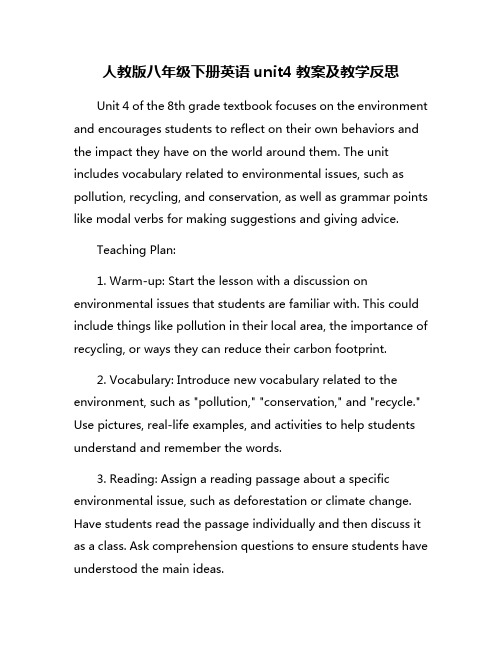
人教版八年级下册英语unit4教案及教学反思Unit 4 of the 8th grade textbook focuses on the environment and encourages students to reflect on their own behaviors and the impact they have on the world around them. The unit includes vocabulary related to environmental issues, such as pollution, recycling, and conservation, as well as grammar points like modal verbs for making suggestions and giving advice.Teaching Plan:1. Warm-up: Start the lesson with a discussion on environmental issues that students are familiar with. This could include things like pollution in their local area, the importance of recycling, or ways they can reduce their carbon footprint.2. Vocabulary: Introduce new vocabulary related to the environment, such as "pollution," "conservation," and "recycle." Use pictures, real-life examples, and activities to help students understand and remember the words.3. Reading: Assign a reading passage about a specific environmental issue, such as deforestation or climate change. Have students read the passage individually and then discuss it as a class. Ask comprehension questions to ensure students have understood the main ideas.4. Grammar: Teach modal verbs for making suggestions and giving advice, such as "should," "could," and "can." Provide examples and practice exercises to help students understand how to use these verbs correctly in context.5. Speaking: Divide the class into pairs or small groups and have them discuss ways they can personally help the environment. Encourage students to use the modal verbs they have learned to make suggestions and give advice to their peers.6. Writing: Ask students to write a short paragraph about a specific environmental issue that interests them. Encourage them to use the vocabulary and grammar structures they have learned in the unit.7. Review: End the lesson with a review of the key vocabulary and grammar points covered in the unit. Use a game or quiz to help reinforce students' understanding and retention of the material.Reflection:Overall, I found that Unit 4 was effective in engaging students and encouraging them to think critically about environmental issues. The vocabulary and grammar points were well-suited to the topic at hand, and the reading and speakingactivities provided ample opportunities for students to practice and apply their language skills.One area for improvement could be to incorporate more real-life examples and practical activities into the lesson. For example, I could have students research a local environmental issue and present their findings to the class, or organize a field trip to a recycling center or conservation area.In conclusion, Unit 4 of the 8th grade textbook proved to be a valuable resource for teaching about the environment. With some adjustments and enhancements, I believe that future iterations of this unit could further enhance students' understanding and appreciation of the world around them.。
八年级下册第四单元教案
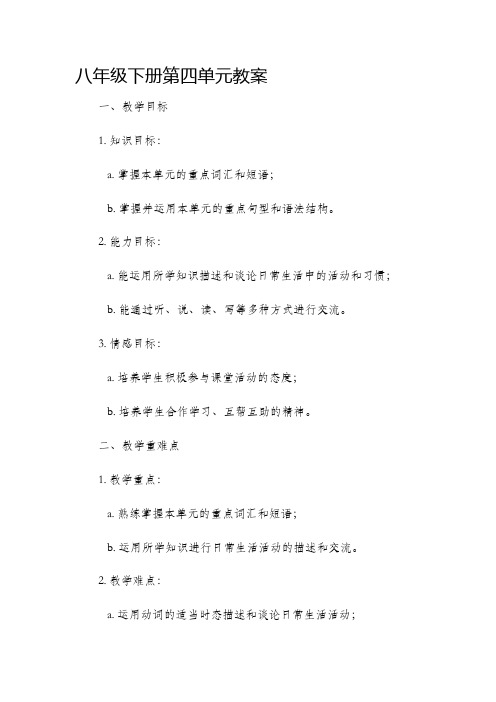
八年级下册第四单元教案一、教学目标1. 知识目标:a. 掌握本单元的重点词汇和短语;b. 掌握并运用本单元的重点句型和语法结构。
2. 能力目标:a. 能运用所学知识描述和谈论日常生活中的活动和习惯;b. 能通过听、说、读、写等多种方式进行交流。
3. 情感目标:a. 培养学生积极参与课堂活动的态度;b. 培养学生合作学习、互帮互助的精神。
二、教学重难点1. 教学重点:a. 熟练掌握本单元的重点词汇和短语;b. 运用所学知识进行日常生活活动的描述和交流。
2. 教学难点:a. 运用动词的适当时态描述和谈论日常生活活动;b. 运用所学知识参与交流活动。
三、教学准备1. 教具准备:a. 多媒体设备;b. 教学课件;c. 黑板和粉笔。
2. 教材准备:a. 《英语八年级下册》教材;b. 本单元课本和练习册。
四、教学过程1. 导入新课(5分钟)a. 利用图片或口头描述引入本单元的话题;b. 提问学生对话题的态度和看法。
2. 学习新知(35分钟)a. 听读课文,学习新的词汇和短语;b. 分组活动,让学生运用所学知识编写对话;c. 集体讨论并展示对话,引导学生进行交流。
3. 巩固训练(35分钟)a. 完成课本上相关练习;b. 进行口语练习,学生两人一组进行对话;c. 教师巡回指导,提供必要的帮助和反馈。
4. 拓展延伸(10分钟)a. 列举更多的日常生活活动和习惯,进行集体讨论;b. 引导学生自主学习相关知识,丰富自己的词汇和表达能力。
5. 课堂总结(5分钟)a. 教师总结本堂课的重点和难点,提醒学生复习巩固;b. 学生反馈自己的学习体会和困难。
五、课后作业1. 完成练习册上相应的练习;2. 总结所学词汇和短语,编写一个短文描述自己的日常活动和习惯。
六、教学反思本节课通过多种教学方法激发学生的学习兴趣,培养了他们积极参与课堂活动的态度。
学生通过听、说、读、写的综合训练,掌握了本单元的词汇和句型,能够运用所学知识进行简单的日常生活交流。
八年级下unit4教案
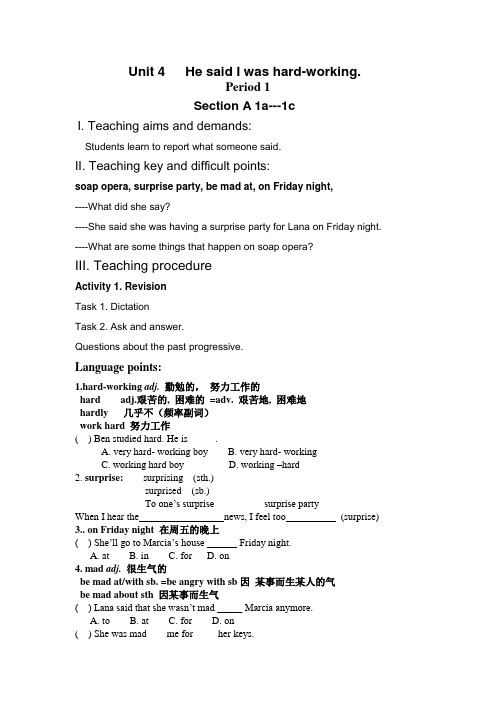
Unit 4 He said I was hard-working.Period 1Section A 1a---1cI. Teaching aims and demands:Students learn to report what someone said.II. Teaching key and difficult points:soap opera, surprise party, be mad at, on Friday night,----What did she say?----She said she was having a surprise party for Lana on Friday night. ----What are some things that happen on soap opera?III. Teaching procedureActivity 1. RevisionTask 1. DictationTask 2. Ask and answer.Questions about the past progressive.Language points:1.hard-working adj. 勤勉的,努力工作的hard adj.艰苦的, 困难的=adv. 艰苦地, 困难地hardly 几乎不(频率副词)work hard 努力工作( ) Ben studied hard. He is _____.A. very hard- working boyB. very hard- workingC. working hard boyD. working –hard2. surprise:surprising (sth.)surprised (sb.)To one‟s surprise surprise partyWhen I hear the news, I feel too (surprise) 3.. on Friday night 在周五的晚上( ) She‟ll go to Marcia‟s house ______ F riday night.A. atB. inC. forD. on4. mad adj.很生气的be mad at/with sb. =be angry with sb因某事而生某人的气be mad about sth 因某事而生气( ) Lana said that she wasn‟t mad _____ Marcia anymore.A. toB. atC. forD. on( ) She was mad ___ me for ____ her keys.A. at ;losingB. about ; losingC. at ; lostD. about; lost5.she is coming to my house to study (不定式做目的状语)Eg: My father give me five yuan a book.(buy)IV. Summarysoap opera, surprise party, be mad at, on Friday night,V. Teaching IntrospectionPeriod 2Section A 2a---Grammar FocusI. Teaching aims and demands :Students learn to report what someone said.II. Teaching key and difficult points:A. Vocabularynot… anymore, bring …to , happen (on), Direct Speech, Indirect Speech.B. Target languageBen told Lana that Marcia was going to have a surprise party for her. She said she was mad at Marcia.He told me he would call me tomorrow / the next day.She said she could speak three languages.III.Teaching procedureStep 1.I am a student. What did he say?-----He said he was a student.I can swim.What did she say ?------She said she could swim.I will ring you up tomorrow.----What did she say?-----She told me she would ring me up.Step 2. 2b.Listening Finish the task.Step 3. 2c.Doing the task. Give students some time to talk about them. Language points:1.. anymore adv 再也,再如(1) not …any more= no more “不再”指数量和程度上的不再,修饰终止性动词【用法】any more 只能放在句末,no more 既可以放入句中(实义动词之前,be 动词,情态动词或助动词之后),也可以放在句末He won‟t go there any more= He will go there no more.(2) not … any longer= no longer“不再”指时间或距离的不再延长,修饰延续性动词2. . happen1)sth.+ happen +地点/时间" 表示"某地(某时)发生了什么事An accident happened in that street. 那条街上发生了一起事故。
人教版初中八年级英语下册第四单元Unit 4 教案含教学反思

Section A 单词allow v.允许;准许wrong adj.有毛病;错误的guess v.猜测;估计deal n.协议;交易relation n.关系;联系;交往communication n.交流;沟通argue v.争吵;争论cloud n.云;云朵elder n.年纪较长的instead adv.代替;反而;却whatever pron.任何;每一nervous adj.焦虑的;担忧的offer v.主动提出;自愿给予proper adj.正确的;恰当的secondly adv.第二;其次communicate v.交流;沟通explain v.解释;说明clear adj.清楚易懂的;晴朗的copy v.抄袭;模仿;复制;复印return v.归还;回来;返回anymore adv.(常用于否定句和疑问句句末)再也(不);(不)再短语look through快速查看;浏览big deal重要的事work out成功地发展;解决get on with和睦相处;关系良好句型1.Many of them are learning exam skills so that they can get into a good high school and later a good university.他们中很多人正在学习应试技巧以便能考入一所好高中,进而升入一所好大学。
2.The Taylors are a typical American family.泰勒家就是一个典型的美国家庭。
3.And they are always comparing them with other children.而且她们总是将自己的孩子和别的孩子相比较。
语法although, so that及until引导的状语从句知识目标掌握课文中的重点词汇及相关短语,并灵活运用。
能力目标学会谈论问题和给出建议情感目标遇到问题要主动地去和家人、朋友或亲近的人交流;如果身边的人遇到问题,能主动提供帮助;要学会放松、缓解压力。
人教版八年级下册英语教案unit4
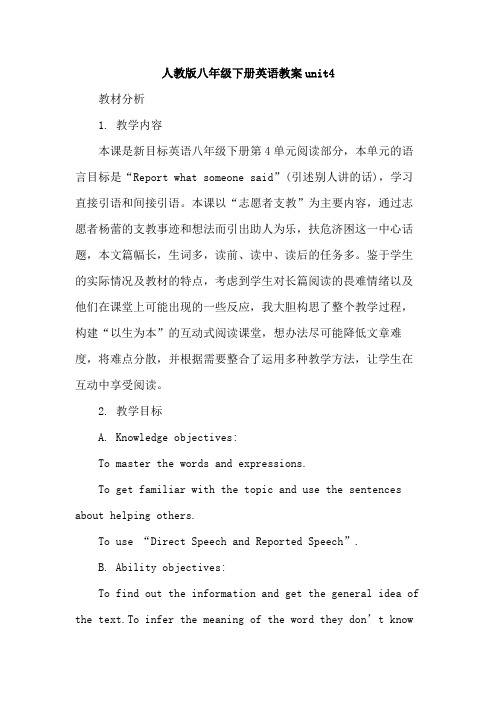
人教版八年级下册英语教案unit4教材分析1. 教学内容本课是新目标英语八年级下册第4单元阅读部分,本单元的语言目标是“Report what someone said”(引述别人讲的话),学习直接引语和间接引语。
本课以“志愿者支教”为主要内容,通过志愿者杨蕾的支教事迹和想法而引出助人为乐,扶危济困这一中心话题,本文篇幅长,生词多,读前、读中、读后的任务多。
鉴于学生的实际情况及教材的特点,考虑到学生对长篇阅读的畏难情绪以及他们在课堂上可能出现的一些反应,我大胆构思了整个教学过程,构建“以生为本”的互动式阅读课堂,想办法尽可能降低文章难度,将难点分散,并根据需要整合了运用多种教学方法,让学生在互动中享受阅读。
2. 教学目标A. Knowledge objectives:To master the words and expressions.To get familiar with the topic and use the sentences about helping others.To use “Direct Speech and Reported Speech”.B. Ability objectives:To find out the information and get the general idea of th e text.To infer the meaning of the word they don’t knowfrom the context.C. Affective objectives:Students are to realize the importance of helping others and they are encouraged to help others.Students’ team spirit will be improved by completing a certain task together.By understanding the life in rural areas, students are to realize how happy they are.3. 教学策略:(1)兴趣激发策略。
人教版英语八年级下册Unit4听说课教案

(设计意图:通过让学生以小组活动的形式结合自身的情况,用2b的语料讨论如何处理与朋友之间的矛盾,对2b进行听前预测。)
Step2While-listening
1.Work on2a.Peter’s friend is giving him advice. Fill in the blanks with could or should.Then check the answers.
计
Unit 4
Why don’t you talk to
your parents?
SectionA(1a-2d)
教
学
反
思
年级学科:八年级英语学科 任课教师:
Unit4课题:Why don’t you talk to your parents?
日期:2021年 月 日
课型:听说课SectionB(1a-1e)
(设计意图:通过呈现小女孩Alice因为数学考试而苦恼的动画,引出本单元话题,并通过讨论学生们平时在学校和生活中存在的问题,激发学生探究问题的欲望,增强学习兴趣。)
(设计意图:呈现1a中的词组并带出句型“What’s the matter?/ What’s the wrong?并在此过程中教授新单词和词组。)
Unit4课题:Why don’t you talk to your parents?
日期:2021年 月 日
课型:听说课SectionA(1a-2d)
主备人:
教学目标
1.词汇:allow, wrong, guess, deal, look through, big deal, work out
人教版英语八年级下册教案:Unit4 Why don’t you talk to your pare

Unit4 SectionA〔1a-2d〕教案1.0Teaching Analysis教情分析1.1Teaching Objectives 教学目的1.1.1Language goals 语言目的allow, wrong, guess, deal, allow sb.to do sth., get into a fight with, be angry with, work out, call sb. up, surprise sb., give sth. back, be good at, although, hang out with, have a fight with, wait that long, talk about1) What’s the matter? P252) What’s wrong? P253) My parents don’t allow me to hang out with my friends. P254) I got into a fight with my best friend? P255) You should call him up. P266) I don’t want to talk about it on the phone. P267) What should I do? P268) But why don’t you forget about it so that you can be friends again? P269) Hope things work out. P2610) I guess you could tell her to say sorry. P2611) I found my sister looking through my things yesterday. P261) I have to study too much so I don’t get enough sleep. P26 (so 作连词,意为“因此,所以〞,表示因果关系。
Unit4Reading教案牛津译林版英语八年级下册
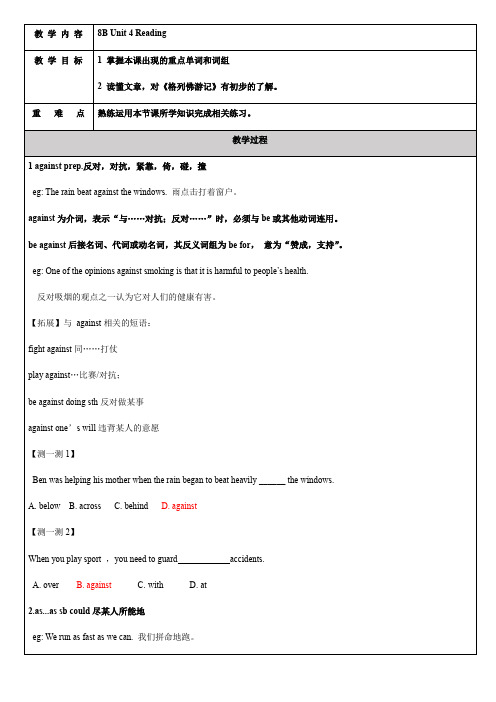
she hopes to e back possible.10 risingPeriod 21.tie2.lift3.continued4.stomach5.against二,6.feet 7.unable 8.1o break 9.to get10.early三、11.B 点拨:本题用句意理解法。
根据上句可以判断本旬句意为"嗯,直到完成作业,我才会上床睡觉". not...until 意为“直到.....·才",固定搭紀.故选B,12.C 点拨:在末尼表示香定的"也”用either13.A 点拨:句意:虽然不同意我的观点.但老教授没有提出他口己的观点,against有“反对”的意思,符合句意.14.C 点拔:本题川固定句型法解题。
考查形容词的比钕等级。
" one of the + 形容词的服高级+可数名词的复数形式”表达“最·.·之一";能够修饰形容问比佼级的词有 much,even,far,a little,a bit.a lot等。
15.D 点拨:木题用辨析法解题.句意:一一哦,我的天啊! 我把钥匙落在屋里了,我不得不从窗户里进大。
一一这很危险。
你最好等你妈妈川米through意为"穿过、通过",表示从某个范川的一端到另一端,强调动作是从物体的内部经过,往往指穿过森林,窗户窖。
故选D.四16.fall over17.crashed against18.was tired out19.managed to reach20.has been away from; as soon as。
人教版八年级下册第四单元Why don't you talk to your parents 教案

人教版八年级下册Unit 4 Why don’t you talk to your parents ?Section A 3a-3c教学重难点教材分析1.教学内容分析本课例的教学内容是人教版八年级下册Unit A 3a-3c,课型为阅读课。
本单元的话题是Family Relations,功能是Talk about problems and give advice, 基本结构有:You should …Why don’t you … ? Maybe you could …本课所选的Section A 3a是两封简短的信,第一封是一个笔名为Sad and Thirteen的女孩向她的老师Mr Hunt 写的求助信。
第二封是Mr Hunt给她提出的建议。
两封信在篇章结构和语言组织上有共同的特点:信的首句为主题句;使用不同的句式来谈论问题和提出建议;使用恰当的连词连结句子,语言紧凑连贯。
2.学生分析我校是农村学校,师资水平和城里的学校比,有一定的差距。
中学生的英语水平不如城里的学生,但是高于其他偏远学校中学生的英语水平。
本节课的话题为家庭关系,与学生的实际生活紧密相关,每个学生的家庭或多或少都有这样或那样的问题,经历相似,因而有话想说,有话可说。
【教学目标】基于对教学内容和学生情况的分析,本课预设了以下目标:1.掌握文中的词汇relation 、communication、argue 、refuse、nervous 、get oninstead、explain 和secondly的用法;2.在语境中感知、理解和运用不同句式描述问题和给出建议;3.学习和掌握阅读策略,根据话题对文章的内容进行预测,通过理解首句快速提炼文章的主旨大意,通过查找关键词迅速地切入文章内容。
4.在预测中充分想象和表达;正确判断教师和同学们的建议;根据信息的逻辑关系进行分析和判断,逐步形成多元思维的习惯。
5.根据短文的文本特征让学生进行仿写练习,恰当运用主题句和连词陈述自己的问题并对他人的观点提出疑点并表达自己的观点6.认识到每个人在成长的过程中总会遇到这样那样的问题,关键是如何面对,积极寻找解决问题的办法。
人教版八年级英语下册Unit4 写作课教学设计(公开课教案)

Unit4 Why don’t you talk to your parents.写作课教学设计Teaching aims:Knowledge aims:Students could get familiar with after-school class and can express their opinions about it.Ability aims:Students will improve their writing and speaking abilities.Students will be able to collect writing materials and organize them according to one point.Emotional aims:Learning this lesson, students will know how to express their opinions logically.Students will learn to consider problems objectively and rationally.Teaching key points and difficult points:Key points:Students can make notes while discussion and arrange their arguments.Difficult Points:Students will learn to consider problems objectively and rationally.Teaching procedures:Step 1 Lead-in1.Greet students.2.Ask students questions “After school, what activities do you usually do?” and show some pictures about activities such as play basketball, play the piano and paint. Students will respond this question actively. In this way, I will lead to today’s topic “ your opinion on after-school classes for children”.(Justification: The question is closely related with the current situation of them and they would actively give answers. The teacher can lead the topic very naturally and it can also arouse students’ interest.)Step 2 Pre-writing1.Debate: Divide students into 2 groups and have a debate about “Your opinions on after-school class for children” One opinion is children should have after-school class because…/ The other opinion is children should not have after-school class because…. While the debate, the teacher will remind students to make notes of the reasons and then conclude the two opinions with students.eful expressions: ask students to pay attention to some conjunction words, such as firstly, then, in a word. And some sentence structures: I don’t really agree with... because...3.Outlining: Ask students to read 3b in the book, and illustrate the formation of letter.(Justification: through debating, students will have the material to write the letter. Through expression learning, the letter will be more logically. This part will lay a foundation for the following writing steps.) Step 3 While-writingDrafting: Ask students write a letter to the magazine to express their expressions on after-school class for children. Give students 15 minutes to write a draft.(Justification: Through writing by themselves, students’ writing ability will be improved.)Step 4 Post-writing1. Peer editing: After the drafting, ask students to check their articles with desk mates. They should read the passage and check the ideas or the logical development. Also, check carefully the grammar, spelling and punctuation of their writings.2. Ask several students to read their passages and then give someevaluations from the advantages and disadvantages.Then ask students to revise their articles according to the evaluations(Justification: The peer editing will help them find the mistakes about spelling , the grammar and the logic, which is a way to learn by themselves. They also learn the advantages and disadvantages from others. ) Step 5 Summary and homeworkSummary:Ask students to act as an assistant teacher to conclude what we have learned this class. And then the teacher will make some supplements.Homework:Do an interview: Ask your family members about their expressions on after-school class for children. And tell your parents your opinions about after-school class.Blackboard design:Expressions on after-school classDear XX,Children should have after-school class/ Children should not haveafter-school classFirstly,Then,In a word,Yours,XXX。
八年级英语下册Unit4AgoodreadComicStrip@welcometotheunit教案

Check:
Eddie asks Hobo ______ ____ ____ with the books. Hobo has not ________ ____. Eddie asks Hobo to give the books to him. Eddie feels __________ because he did not know that Eddie _____ books. In fact, Eddie wants to use the books to ______ the box on the fridge.
T:Understand? S:Yes.
T:I’ll give you 2 minutes .Please go...
T: OK ,Now,any questions?
Who can answer? (let’s Ss read for the others)
He /She reads once.You read twice,Are you clear?
Step 4 Guide Three (9’)
Please read the text with your partner within 3 minutes, then act it out .
Have a match! Which group can do it best?(The teacher
T: Are you clear ? S: Yes.
T:Do you like readingin your spare time? S:
T:What books do you like reading?S:...
T:OK,Let’t go on.
人教版八年级英语下Unit 4 初中八年级下册英语教案教学设计课后反思
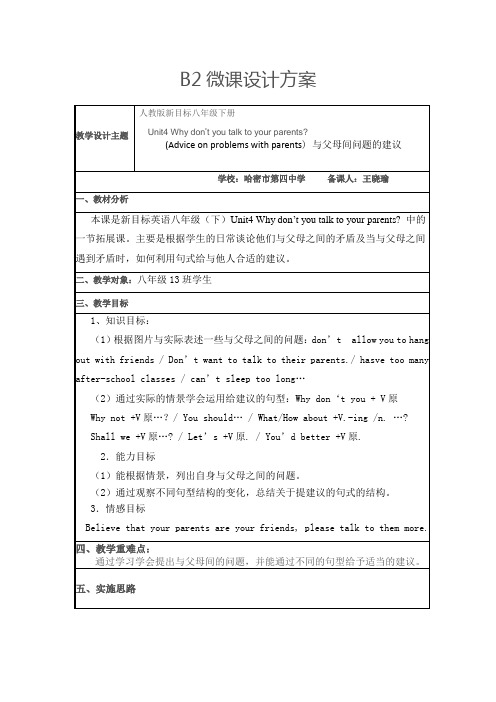
Step6.Feedback
Do some exercises.
1. Why not ______ her a scarf?
A. get B. to get C. getting D. gets
2. A nice day, isn’t it?
Yes, _____going for a picnic and relax ourselves?
A. Would you like B. Why not
C. What about D. why don’t
3.为什么你不跟你父母道歉呢?
____ ____ _____ say sorry to your parents?
4. Why don’t you read more books?(同义句转换)
Step2Let’s Watch
1.Watch a video together about a little boy’s life.
2.Afterwatching,talk about the problems the boy met with his parents and feelings.
Step3Let’s Talk
二、教学对象:八年级13班学生
三、教学目标
1、知识目标:
(1)根据图片与实际表述一些与父母之间的问题:don’t allow you to hang out with friends/Don’t want to talk to their parents./hasvetoo many after-schoolclasses/can’t sleep too long…
B2微课设计方案
教学设计主题
2023年牛津译林版八年级英语下册Unit4 task教案
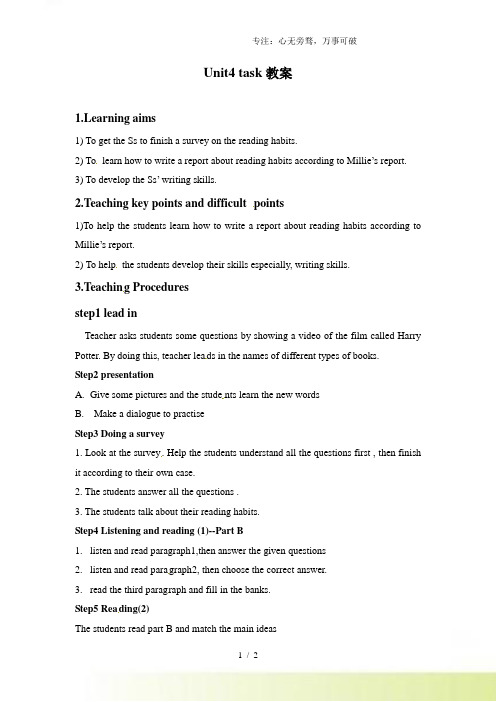
Unit4 task教案1.Learning aims1) To get the Ss to finish a survey on the reading habits.2) To learn how to write a report about reading habits according to Millie’s report.3) To develop the Ss’ writing skills.2.Teaching key points and difficult points1)To help the students learn how to write a report about reading habits according to Millie’s report.2)To help the students develop their skills especially, writing skills.3.Teaching Proceduresstep1 lead inTeacher asks students some questions by showing a video of the film called Harry Potter. By doing this, teacher lea ds in the names of different types of books.Step2 presentationA.Give some pictures and the stude nts learn the new wordsB. Make a dialogue to practiseStep3 Doing a survey1. Look at the survey. Help the students understand all the questions first , then finish it according to their own case.2. The students answer all the questions .3. The students talk about their reading habits.Step4 Listening and reading (1)--Part B1.listen and read paragraph1,then answer the given questions2.listen and read para graph2, then choose the correct answer.3.read the third paragraph and fill in the banks.Step5 Rea ding(2)The students read part B and match the main ideasStep6. WritingUse Millie’s report as a mod el. The students learn the useful express ions to get ready for the coming writing.They do the exercise orally paragraph by paragraph first, then write dow n their own reading habits .Step7. checkStep8 homework。
八年级英语下册教案:Unit4 Why don't you talk to your parents
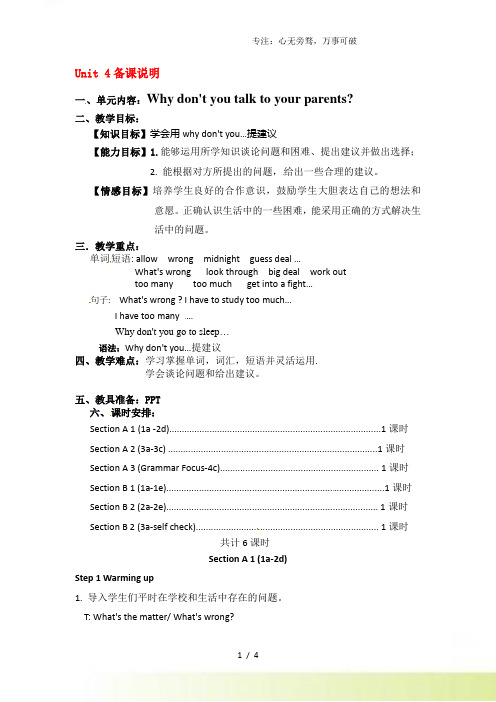
Unit 4备课说明一、单元内容:Why don't you talk to your parents?二、教学目标:【知识目标】学会用why don't you…提建议【能力目标】1.能够运用所学知识谈论问题和困难、提出建议并做出选择;2. 能根据对方所提出的问题,给出一些合理的建议。
【情感目标】培养学生良好的合作意识,鼓励学生大胆表达自己的想法和意愿。
正确认识生活中的一些困难,能采用正确的方式解决生活中的问题。
三.教学重点:单词短语: allow wrong midnight guess deal …What's wrong look through big deal work outtoo many too much get into a fight…句子:What's wrong ? I have to study too much…I have too many …Why don't you go to slee p…语法:W hy don't you…提建议四、教学难点:学习掌握单词,词汇,短语并灵活运用.学会谈论问题和给出建议。
五、教具准备:PPT六、课时安排:Section A 1 (1a -2d)....................................................................................1课时Section A 2 (3a-3c) ...................................................................................1课时Section A 3 (Grammar Focus-4c)............................................................... 1课时Section B 1 (1a-1e)......................................................................................1课时Section B 2 (2a-2e).................................................................................... 1课时Section B 2 (3a-self check)........................................................................ 1课时共计6课时Section A 1 (1a-2d)Step 1 Warming up1. 导入学生们平时在学校和生活中存在的问题。
人教版八年级英语下册Unit4SectionA3a—3c教案设计设计

⼈教版⼋年级英语下册Unit4SectionA3a—3c教案设计设计Unit 4 Why don’t you talk to your parents ?I. Teaching aims1.Aims of the knowledge(1)Let the students talk about the problems and give some advice to use the sentence W hy don’ t you do ...?(2)Make the students know the spelling of the new words and usage of the key words.(3)Make the students use the key words and make their own sentences.2.Aims of the abilities(1)Train the students to use the key words and express their thoughts.(2)Develop the students’ abilities of listening , speaking, reading and writing .3.Aims of the emotion(1)Make the students understand how to talk about problems and express feelings.(2)Make the students understand how to help others and get on well with others.4.Teaching keys and difficulties(1)Learn to use the sentence W hy don’ t you do ...?(2)Make the students master the new words communicate, communication ,explain, copy, deal, allow...and so on.(3)The students can make their own sentences and write a passage.II. Teaching methodsAs we all know , the teacher should use proper teaching methods in different classes. So according to learning background ,I will use the following methods:(1)Situational teaching method(2)Task-based language teaching method.III. Analysis of the studentsOur students are almost from the countryside, they are lack of knowledge and cultural background of the foreign countries and some students don’t like English, therefore, I will have students study in a relaxing atmosphere and encourage them to get over shyness , open their mouths to speak and take an active part in activities. IV. Teaching procedures.Step I. Leading-inLet's have a free talk .T: I hear the students from NO.18 Middle School are very friendly , you like helping others. So if my friends and I meet some problems , can you help us ?S: Yes(I will lead in to my new lesson in this way, the purpose is to arouse the students’interest in study.)Step II. PresentationI will show some pictures to the students, let the students guess what trouble he or she has and give them some advice. Lead the students to use the new words , phrases and the sentence W hy don’t you do ...?Picture 1.T: My friend Jimmy met a big problem, his parents don’t allow him to hang out with his friends. If I were Jimmy,what should I do ? Can you help me ?S: Why don’t you communicate with them ?Why don’t you have a communication with them ?...T: Please pay attention to allow , hang out , communicate , communication.Picture2.T: Look at the screen.W hat’s t he matter with Cathy ?S: She has too much homework.She studies too much.T: Maybe she has two problems.Can you tell me about her another problem?S: She has too many after-school activities.T: Please pay attention to too much and too many.Picture 3.T: What’s the matter with Bob?S: He is arguing with his friend. He is having a fight with his friend.T: If I were Bob, what should I do ?S: Why don’t you call him up and explain the thing clearly ...Pay attention to call, explain and explanation.Picture 4.T: What’s wrong with Tom?S: His friends are copying his homework.T: If I were Tom, what should I do ?SA: C opying others’ homework is wrong.SB: C opying homework isn’t a big deal.T: Pay attention to copy and deal.When the students answer my questions, I will write key words and phrases on the blackboard. Read the phrases and teach each key words carefully.NO1.allow1.My parents don’t allow me to hang out.2. The police allow parking here.NO2.communicate v.Why don't you sit down and communicate with your parents ?communication n.1. Have a communication with your parents.2. Mobile phones are important means of communication.NO3.deal---dealt---dealtv. 1. How do you deal with the problem?What do you do with the problem?n. 1. That’s a deal.2. It’s not a big deal.3. I have a great deal of work.NO.4explainv. explain sth to sbexplain a difficult problem to Tomn. explanation give a clear explanationNo.5copyv. copy the sentence downn. 1. I made four copies of the letter..2. Over one thousand copies of the books were sold out.After I explain all of the words and phrases, I will ask students to make their own sentences with the words. Divide them into some groups and have a competition, and find out which group can make more sentences.(The purpose of this step is to help the students understand the usage of the key words)Step. III Listening practiceListen and complete the passage.All the blanks are key words. I want to review the key words by listening practice . After listening twice , check the answers. And I will just show them the key words , ask students to make their own sentences by using any word they like. After that, ask the students to answer the question What problems does the boy have ?Ask the students to give him some advice.(The purpose of this step is to review the key words by listening practice )Step IV. WritingAt the same time, I will go on my next step---writing practice. I will give the students five minutes to write a short letter to the boy and give him some good advice using the words, phrases and sentences we have reviewed in class. And I will ask one student to come to the blackboard and let the students check his passage together. (The purpose of this step is to further practice the key words. )Step V. SummaryIn our daily life, we may meet some problems, we should try to communicate with others to solve the problems. On the other hand, we should try our best to help the people in need. In a word, Help others to enjoy yourself.Step VI. HomeworkI think homework is so important that students should practice English as much as they can in class or after class. It isnecessary for the students to do some exercises after class. So I give them homework: Ask your best friend what his problems are ? And give him or her some good advice. V. Blackboard design.Unit 4 Why don’t you talk to your parents ?Words Phrasesallow hang out , talk with sbcommunicate call sb upcommunication have a fight with sbexplain explanation get on well with sbcopy deal write a letter to sb。
人教版八年级英语下册Unit4教学设计

(三)学生小组讨论,500字
在学生小组讨论环节,我会将学生分成若干小组,每组四人。我会给每个小组发放一张包含不同国家美食的图片,让学生结合所学词汇和句型,讨论以下问题:
1.学生对英语学习仍保持较高兴趣,但学习积极性存在一定程度的差异,部分学生需要更多的鼓励和支持。
2.学生在口语表达方面有一定基础,但在实际运用中,词汇和句型的运用仍不够熟练,需要加强练习。
3.学生的阅读理解能力有待提高,对于文章中细节信息的捕捉和推断能力需要进一步培养。
4.在写作方面,学生能够完成简单句子的编写,但文章结构、逻辑性和表达能力仍有待提高。
人教版八年级英语下册Unit4教学设计
一、教学目标
(一)知识与技能
在本章节的学习中,学生将掌握以下知识与技能:
1.掌握并运用本单元的词汇和短语,如:dish, delicious, spicy, favor, taste, ingredient, recipe等,能将这些词汇运用到日常交流中。
2.学会使用一般现在时描述个人喜好和日常生活习惯,如:“I like/don't like...”, “I usually...”等。
(一)教学重难点
1.重点:本章节的重点在于使学生掌握描述饮食喜好和日常饮食习惯的词汇、短语和句型,以及运用一般现在时进行表达。
难点:学生在实际对话中灵活运用词汇和句型,以及阅读文章时对细节信息的捕捉和推断。
2.重点:培养学生跨文化交际意识,了解不同国家的饮食文化。
- 1、下载文档前请自行甄别文档内容的完整性,平台不提供额外的编辑、内容补充、找答案等附加服务。
- 2、"仅部分预览"的文档,不可在线预览部分如存在完整性等问题,可反馈申请退款(可完整预览的文档不适用该条件!)。
- 3、如文档侵犯您的权益,请联系客服反馈,我们会尽快为您处理(人工客服工作时间:9:00-18:30)。
Unit 4 He said I was hardwork ing.Part 1: Teach ing Desig n第一部分:教学设计Period 1: Writing, Listening and Speaking (Page 26)(What ' s the best movie theater to go to?)Objectives•To lear n to report what some one said•To lear n to use reported speechProcedures■ Warming up lear ning about direct speech and reported speechIn direct Speech (also referred to as 'reported speech') refers to a sentence report ing whatsome one has said. It is almost always used in spoke n En glish.If the report ing verb (i.e. said) is in the past, the reported clause will be in a past form. This form is usually one step back into the past from the original.For example:He said the test was difficult.She said she watched TV every day.Jack said he came to school every day.If simple present, present perfect or the future is used in the reporting verb (i.e. says) the tense is retained. For example:He says the test is difficult.She has said that she watches TV every day.Jack will say that he comes to school every day.If reporting a general truth the present tense will be retained.He said, “I live in Paris. ” He said he lived in Paris.He said, “I am cooking dinner. ”He said he was cooking dinner.He said, “I have visited London twice. He said he”had visited London twice.He said, “I went to New York last weekH.e said he h”ad gone to New York the week before.He said, “I had already eaten. ”He said he had already eaten.He said, “I am going to find a new job.He said he w”as going to find a new job.He said, “I will give Jack a call. He sa”id he would give Jack a call.1a GROUPWORKHello, class! We shall go to watch a soap opera first of all. But let 's talk about these questions first.What is a sopa opera? What are some of the soap oeras you know? Do you ever watch soap opera? What are some things that happen on soap opera?A soap opera is a television or radio program that airs in episodic installments. This means that each episode con ti nues tell ing a story, which, in turn, tells more of the last episode's story. A sin gle story on a soap opera can be told for weeks, mon ths, or sometimes even years.In America, each soap opera airs every day, Mon day through Friday, in the after noon. Because they air at this time, they are sometimes called daytime serials. In the U.K. and other countries, the soap operas air inthe eve ning, twice or three times a week.This is a list of soap operas that air in America. They are listed by how many people watch them each day. The first show has the most people watch each day, and the last show is watched by the fewest people:★The Young and the Restless★The Bold and the Beautiful★Gen eral Hospital★Days of Our Lives★All My Childre n★As the World Turns★One Life to Live★Guidi ng Light★Passi ons1b Liste ning and nu mberi ngListe n and nu mber the stateme nts [1-4] on page 26 in the picture.Turn to page 89. Read the conversation. While reading remember to cut/ the sentence into thought groups, study all the predicates,〔circle all the linking words and underline all theexpressi ons.In pairs you are to ask and an swer about what the people in the soap opera said.(Ben told Lana that Marcia was going to …)Objectives•To lear n to use simple past tense•To learn to use Can for abilityProcedures■ Warming up by ask ing and an sweri ngGood morning, class.What did your father say to you this morning before you came to school? He said he was falli ng in touch with En glish.What did your mother say to you this early morning? She said she was going skat ing with her pet cat on Sun day.What did your brother say to you? He said he was mad at the World Cup.What did your brother say? He said he wasn' g oing to the Earthquake Museum on Friday ni ght.2a Liste ning and circli ngListen and circle true or false for each statement.T ue2. Lana said (that) s he wasn ' t mad at MOacanymore. true3. Lana said that she wouldn ' t go to Marcia ' s house OnuFriday night.4. Marcia called every one and told them (that) she was n ' t going to have the par t yu 耳5. Lana told Marcia (that) she would bring some books to her house on Friday night. false 2b Liste ning and circli ngListe n aga in. What did the people on TV say? Circle the correct an swers.(Keys: 1-is; 2-will; 3-am; 4-am; 5-will)Now go to page 89 to read the conversation. While reading, cut/ the sentence into thought groups, study all the predicates, dircle all the linking words and underline all the expressions. That ' s grammar study, in deed.Now let ' try to talk by imitation. Imitation talking is using the structure of an example conversation as a form to talk about something of our own.Talk as they do.(仿说)2c Pairi ng and speak ingNow in pairs you will make a conversation about Young Lives ” that you saw last night.Period 3: Reading, Writing and Speaking (Page 28)(Young Lives ” this week)Objectives•To lear n to report what some one said•To learn to use Can for abilityProcedures■ Warming up by lear ning about superlatives with -i) est, the mostGood morning. Have you see n the soap opera Only One Life? Do you like it? Can you tell us some of the story? What time did you see it? My favorite man in the soap opera is the science teacher. What does he look like? Where did you see the soap opera? What do you think of the soap opera? By the way, how often do you see a soap opera? I 'm older than you are. But I ' m more outgo ing tha n you. I see soap operas on every Sun day. I ' m going to be aoap opera actor. Could you please tell me what the best soap opera radio station is? In our next term we will be very busy. Will we have time to watch a soap opera on TV? What should we do if we don ' have the time? What were you doing when I was watching Only One Life last night? My brother said he was work ing on his En glish homework when I was watch ing the opera. Today we are going to watch another opera. It is Young Lives. Now let 'go to page 28.3a Reading and fillingNext you are going to read a n ewspaper story on page 28 and try to fill in the bla nks.Now read the text aga in and copy all the useful expressi ons in your no tebook.Next we are going to do some writing practice. Let ' imagine the next episode of Young Lives ” and try to finish the newspaper story on page 28.Marcia was go to have a surprise party for Lana on Friday night. She went shopping to buynice things for Lana. Lana arrived with drinks and snacks at Marcia ' s house at 7 o was sad whe n she found the door was not ope n. She waited for half an hour, cold and hun gry.10 more minu tes passed. Lana called every one and asked them where Marcia was. Nobody was sure where she was. Lana became mad at Marcia. While she was walking back home she sudde nly found Marcia lying on the street. She ran to ask her what had happe ned to her. Marcia told Lana that she was going to die. Lana called the police, and asked for help. At hospital Marcia got better. She told Lana that she had bee n tooexcited for the party that she fell dow n on the street with the things that she had bought. Lana told Marcia that she was n anymore, and that she would go to Marcia ' s house on Saturday night. However, Marcia said that she wasn ' t going to have the party because she was too ill to stand up.4 GROUPWORKIn groups of four you are going to role-play conversations according to the three role-play cards on page 28.What is she doi ng?B: She is doing a homework project with me.A: That ' great. C borrowed my jacket last Sun day. She saidthat she would return it to methis Mon day. Today it isWedn esday, and she hasnot returned it to me.B: You mean that I go and tell her to get your jacket back toyou?A: Yes, that is what I mean. B: She said that you hadborrowed her jacket. And shetold me you had promised toretur n it to her on Mon day.C: Yes, I did. But I have given itback to her mother.B: Then 1 will call A up and tellher that you have retur ned itto her mother.C: Thanks a lot. I would meetyou soon. 1 like to invite youto tea.A: I have heard of that.C: B told me just now that youwant to take back the jacket.A: Yes, that ' s it.C: This morning I went to thebus stop to meet you andgive it to you. I waited for tenminu tes there, but didn ' tsee you.A: Sorry, but I was there.Maybe I was at the wrongbus stop.C. You asked me to wait at DaYing Pan Bus Stop. Is thatright?Period 4:Checking, Listening and Speaking (Page 29)(I did OK in some subjects.)Objectives•To lear n to report what some one said•To lear n to use simple past tenseProcedures■ Warming up by lear ning more about reported speechReported speech (also called In direct Speech) is used to com muni cate what some one else said, but without using the exact words. A few changes are necessary; often a pronoun has to be cha nged and the verb is usually moved back a ten se, where possible.EG: He said that he was going to come. (The person's exact words were “ I ' m going to come.(Direct speech is used to give the exact words used by another speaker. The words are given between quotation marks ( “” ) in writing:EG: "I ' m coming noW, he said.)1a Readi ng and check ingHi, class. Turn to page 29 and read and check the sentences that are true for you. I ' m hard working."I ' m good at speaking.I ' m lazy.In English I ' m better at reading tha n ingte VI can do better in math.It is impossible for me to learn English well in China.I ' m bored at English.I ' ve read hundreds of English short stories VI lik ing readi ng aloud in En glish. VI can call people up in En glish.I am gett ing on well with my En glish lear ning.I listen to Teen Talk in English every day. V1b PAIRWORKIn pairs you will talk about your an swers in activity1a.2a Listening and fillingYou will liste n and fill in the speech bubbles with words.2b Liste ning and check ingListen again to check Scott "sreport card. (Key : 3)Turn to page 89. Read the con versati on on page 89.While reading remember to cut/ the sentence into thought groups, study all the predicates, circle |all the linking words and underline all the expressions.Now read the con versati on aga in to turn it into a text.Turn the conversation into a text.( 改写)2c PAIRWORKWe are going to role-play a con versati on betwee n a pare nt and a stude nt. The pare nt asks about his son ' s report card.A: What did your math teacher say?B: He said I was hard work ing.A: What did your Spanish teacher say?B: He said I was good at speak ing.A: What did your history teacher say?B: He said I could do better.A: What did your scie nee teacher say?B: He said I was a lazy stude nt.(How ' it going?)Objectives•To lear n to use simple past tense•To learn to use Can for abilityProcedures■ Warming up by talk ing about report cardsHello, class. It ' report card time. I got my report card today. I always get nervous when I see the en velope from school in the mail. But luckily I did well this term. I had a really hard time with math. My history teacher said I could do better. The good n ews is that my En glish teacher said I was very good. And my En glish said my liste ning was good. That's about all the n ews I have for you.Let' go on to read a letter from Ala n to his gra ndma about his report card.3a Readi ng and findingTurn to page 30 and read Alan ' s letter to his grandmother.While you are reading the letter, you will cut/ the sentence into thought groups, study all the predicates, circle all the linking words and underline all the expressi ons.After school, you will copy the expressions into your notebook.You may pretend to be Scott. Make use of the information from 2b to write to your friends about your report card.Next go on to write your own report card. Just have fun. You don 'have to tell the truth.Read your report card by your teacher. Tell your partner what your teacher said.Now read the letter in 3a again to turn it into a conversation.Turn the letter into a conversation.(改写)SELF CHECK1 Filli ng in bla nks with words give nTo see how you are getting on with your English turn to page 31 and read the five sentences to complete them with the words give n.Go to page 31 to read the story. While reading remember to cut/ the sentence into thought groups, study all the predicates, birclelall the linking words and underline all the expressions. in school, have a big fight, talk to me, copy my homework, a good idea, start a bad habit, do her own work, get really mad at me, get over it, do her own workAnd now turn the story into a conversation.Reading: She said helping others changed her life.Before you read —please go over the vocabulary list for this unit at the back of your textbook. While you read —cut/ the sentence into thought groups, study all the predicates, circle all the linking words and underline all the expressi ons.After you read —copy all the useful expressi ons into your no tebook.。
